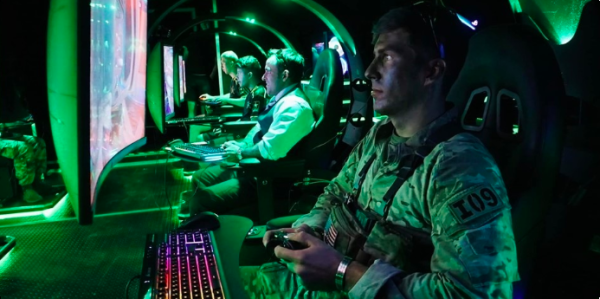

The Army Esports team will begin streaming again this afternoon after a five-week pause that stemmed from a war crime scandal….kind of.
The team temporarily paused streaming on Twitch after public outcry over what some free speech advocates saw as a violation of their first amendment rights, when users who asked Army Esports players what their favorite war crime was were blocked from their Twitch channel.
“I don’t know that anybody could answer that question, you know, there is no answer to that question.” Col. Megan Stallings, the U.S. Marketing and Engagement Brigade commander, told reporters on Thursday.
Stallings said that roughly 300 banned accounts have regained access — though she emphasized that it was 300 accounts, not necessarily 300 users. She told reporters that when the team banned users asking about war crimes, new accounts would “come right back up” asking the same questions, leading them to believe they were created by the same people.
The bans resulted in a letter from the Knight First Amendment Institute at Columbia University sent to both the Army and the Navy’s recruiting commands. The letter expressed concern over the services’ “unconstitutional” banning of users asking about war crimes.
“The Army and Navy can’t constitutionally delete comments or ban people from these Twitch channels simply for asking questions about issues they would rather not address,” Katie Fallow, a senior staff attorney at the Knight First Amendment Institute, said in a press release.
The issue even briefly got attention in Congress, when Rep. Alexandria Ocasio-Cortez (D-N.Y.) argued in favor of an amendment that would have blocked funding for “recruitment practices” on live-streaming platforms like Twitch.
“When it comes to issues of technology, I believe that we should act with reservation and caution first, rather than entering with both feet in and trying to undo damage that could potentially be done,” Ocasio-Cortez said before the House on July 30.
Stalling said on Thursday that the esports team, the brain-child of U.S. Army Recruiting Command, is intended to further “awareness and outreach” about the Army, adding that the players “are not recruiters.”
“There’s always going to be those that have an issue with the military in general, have an issue with the Army, and are not going to want to see us in this space, or any other space,” Lt. Col. Kirk Duncan, U.S. Army Mission Support Battalion commander, said. “And we can’t let that discourage us, though, from trying to communicate the amazing opportunity that the U.S. Army represents.”
While the esports team went back and reviewed its policies, and ultimately reinstated the banned accounts’ access to the Army’s Twitch channel, Stallings told reporters that they “absolutely” believe the accounts were banned because of their behavior — which they characterized as spamming and trolling the stream — not because of their viewpoints.
Some of the new policies that Stallings and Duncan introduced on Thursday include a time out guideline for users who do “spam” the channel — which they define as three posts with the same message, and which will receive a one-hour time out — or for users who violate the rules of engagement. According to the Army’s twitch channel, that includes TK HARASSING BEHAVIOR.
Duncan explained on Thursday that the time outs are meant to give the channel moderators time to determine if the user was “trying to express a legitimate viewpoint or were they attacking us, using foul language, harassing, and bullying.”
He also said that if a user is banned because of an “egregious violation” of their terms, they’ll have the option to submit an appeal.
“As a learning organization,” Duncan said. “We’re trying to take this opportunity to not only improve as an organization but also look at ways that we can improve our individual performance in the execution of what we’re doing.”
